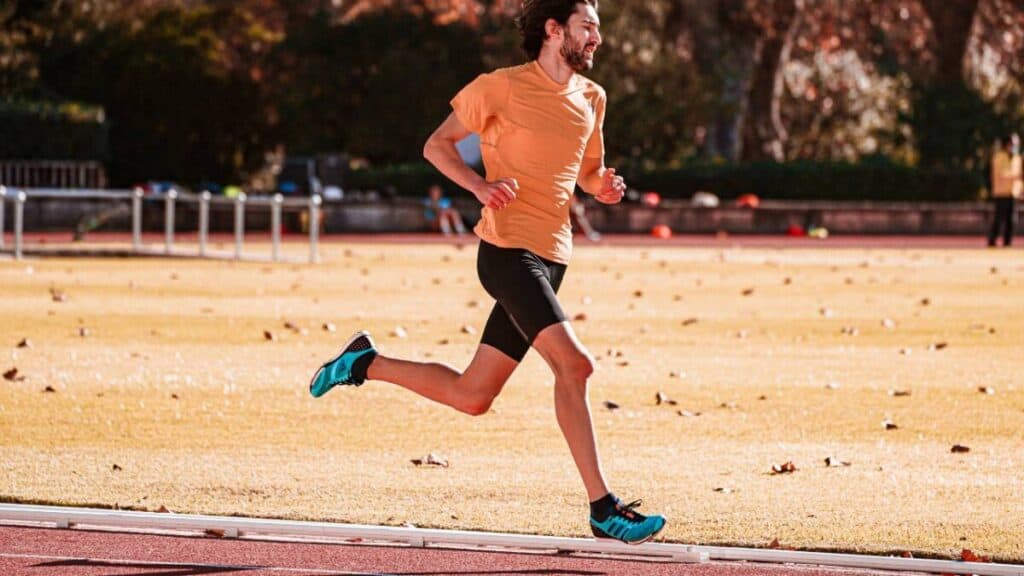Are you wondering how long it takes to run 5 km? This is a common question among runners, whether you’re a beginner or a seasoned athlete. The average time to run 5 km can vary depending on a variety of factors, including age, gender, fitness level, and terrain.
On average 23:58 is the typical time for finishing a 5 km run, regardless of age or gender. The fastest recorded 5 km time is an incredible 12:51. Beginners typically achieve a time of 30 minutes and more advanced runners around 20 minutes.
Table of Contents
Average 5 km Run Time By Age & Gender
| Average Time to Run 5 km For Males | ||||||
| Age | Beginners | Intermediate | Advanced | |||
| 15-20 | 30:05 | 20:05 | 17:00 | |||
| 20-25 | 29:35 | 21:00 | 16:35 | |||
| 25-30 | 29:50 | 19:40 | 17:00 | |||
| 30-35 | 30:05 | 19:50 | 17:10 | |||
| 35-40 | 30:25 | 19:55 | 17:35 | |||
| 40-45 | 32:40 | 21:20 | 19:00 | |||
| 45-50 | 33:50 | 21:50 | 19:35 | |||
| 50-55 | 35:25 | 24:35 | 20:20 | |||
| 55-60 | 37:00 | 25:40 | 22:55 | |||
| 60-65 | 40:15 | 27:15 | 24:20 | |||

| Average Time to Run 5 km For Females | ||||||
| Age | Beginners | Intermediate | Advanced | |||
| 15-20 | 36:40 | 25:05 | 20:25 | |||
| 20-25 | 37:05 | 22:55 | 20:00 | |||
| 25-30 | 37:10 | 23:10 | 20:20 | |||
| 30-35 | 37:20 | 23:30 | 20:40 | |||
| 35-40 | 38:05 | 24:20 | 21:10 | |||
| 40-45 | 38:30 | 24:55 | 22:15 | |||
| 45-50 | 38:40 | 25:15 | 22:55 | |||
| 50-55 | 38:45 | 26:05 | 23:25 | |||
| 55-60 | 42:40 | 27:55 | 24:35 | |||
| 60-65 | 45:10 | 30:05 | 25:15 | |||
Other Running Distances You Might Like
What is the Average Time to Run a 5K?
If you’re new to running, you might be wondering what is considered a good 5K time or what the average 5K time is. A 5K is a popular race distance that is equivalent to 3.1 miles. It’s a great goal for beginners and seasoned runners alike.
The average 5K time varies depending on a few factors, such as age, gender, and fitness level. However, according to Runner’s World, the average 5K time for men is around 28 minutes, while the average time for women is around 34 minutes.
To calculate your own pace for a 5K, you can use a pace calculator. This will give you an idea of how long it will take you to finish a 5K based on your current running pace.
If you’re looking to improve your 5K time, it’s important to focus on your race pace. This is the pace that you can maintain throughout the entire race. To find your race pace, try running at a steady pace for a few minutes and then gradually increasing your speed. You should be able to maintain this pace for the entire 5K race.
The fastest 5K times are achieved by elite runners, with the world record for men being 12 minutes and 37 seconds and the world record for women being 14 minutes and 11 seconds. However, for most runners, a good 5K time is one that they are proud of and that they have worked hard to achieve.
There are many 5K races held throughout the year, from charity events to competitive races. If you’re looking to participate in a 5K race, be sure to train properly and set realistic goals for yourself. With dedication and hard work, you can achieve your desired finish time.

Factors that Affect Your 5K Time
When it comes to running a 5K, there are many factors that can affect your time. Some of these factors are physical, while others are related to your training. In this section, we will explore some of the most important factors that can impact your 5K time.
Physical Factors Running 5 km
Your physical condition can play a significant role in your 5K time. Some of the physical factors that can affect your time include:
- Age: As you get older, your body may not be able to perform at the same level as it did when you were younger.
- Rest: Getting enough rest is essential for allowing your body to recover and perform at its best.
- Sex: Men and women have different physical characteristics that can impact their running performance.
- Speed: Your natural running speed can affect how quickly you can complete a 5K.
- Strength: Having strong muscles can help you run faster and more efficiently.
- Injury: Any injuries or pain can slow you down and affect your performance.
- Walking: If you walk during the race, it will slow down your overall time.

Training Factors Running 5 km
Your training program can also impact your 5K time. Some of the training factors that can affect your time include:
- Beginner: If you are new to running, it may take some time for your body to adjust to the demands of running a 5K.
- Training program: Following a structured training program can help you improve your running performance.
- Fitness level: Your overall fitness level can impact how quickly you can run a 5K.
- Cycling: Cross-training with cycling can help improve your cardiovascular endurance and leg strength.
- Interval training: Incorporating interval training into your workouts can help improve your speed and endurance.
- Age and sex: Your age and sex can impact how you respond to different types of training.
- Walker: If you are a walker, you may need to adjust your training program to improve your walking speed and endurance.
- Warm-up: A proper warm-up can help prepare your body for the demands of running.
- Endurance: Building up your endurance through longer runs can help you maintain a faster pace for longer periods.
- Strength training: Incorporating strength training into your routine can help improve your overall running performance.
- Diet: Eating a healthy diet can help provide your body with the nutrients it needs to perform at its best.
- Terrain: Running on hilly or uneven terrain can slow you down and affect your performance.
- Running shoes: Wearing the right running shoes can help improve your running form and reduce your risk of injury.
Overall, there are many factors that can impact your 5K time. By paying attention to these factors and making adjustments as needed, you can improve your performance and achieve your running goals.

How to Improve Your 5K Time
If you’re looking to improve your 5K time, there are a few things you can do to train more effectively, eat better, and recover faster. Here are some tips to help you get started.
5km Training Tips
To improve your 5K time, you need to focus on both your endurance and your speed. Here are some training tips to help you do that:
- Incorporate interval training into your workouts. This means alternating between periods of high-intensity running and periods of rest. This will help you build both endurance and speed.
- Increase your weekly mileage gradually. This will help you build endurance without risking injury.
- Work on your running form. Good running form can help you run more efficiently and reduce your risk of injury.
- Hire a coach or join a running group. A coach or group can provide you with accountability, motivation, and guidance.
5km Nutrition Tips
Your diet plays a crucial role in your performance. Here are some nutrition tips to help you improve your 5K time:
- Eat a balanced diet that includes plenty of fruits, vegetables, whole grains, and lean protein.
- Stay hydrated before, during, and after your runs.
- Avoid eating too much before a run. A light snack, such as a banana or a granola bar, is usually sufficient.
- Consider taking a sports drink or gel during your run to help you maintain your energy levels.
Rest and Recovery Tips After a 5k
Rest and recovery are just as important as training and nutrition. Here are some tips to help you recover faster and reduce your risk of injury:
- Take at least one rest day per week.
- Get plenty of sleep.
- Stretch before and after your runs.
- Consider incorporating strength training and yoga into your routine to improve your balance, coordination, and running economy.
Remember, improving your 5K time takes time and dedication. Be patient, stay consistent, and focus on making gradual improvements.

5K Training Schedules for Novice, Intermediate, and Advanced Runners
If you’re a new runner looking to complete your first 5K (3.1 miles), or an experienced runner looking to improve your time, following a training schedule can help you achieve your goals. Here are some training schedules for novice, intermediate, and advanced runners:
Novice Runner 5K Training Schedule
If you’re new to running, it’s important to start slowly and build up your endurance gradually. Here’s a 5K training schedule that’s perfect for novice runners:
| Week | Workout 1 | Workout 2 | Workout 3 |
|---|---|---|---|
| 1 | Walk 20 min | Walk 25 min | Walk 30 min |
| 2 | Walk 20 min, Run 1 min x 5 | Walk 25 min, Run 1 min x 6 | Walk 30 min, Run 1 min x 7 |
| 3 | Walk 20 min, Run 2 min x 4 | Walk 25 min, Run 2 min x 5 | Walk 30 min, Run 2 min x 6 |
| 4 | Walk 20 min, Run 3 min x 3 | Walk 25 min, Run 3 min x 4 | Walk 30 min, Run 3 min x 5 |
| 5 | Walk 20 min, Run 4 min x 2 | Walk 25 min, Run 4 min x 3 | Walk 30 min, Run 4 min x 4 |
| 6 | Walk 20 min, Run 5 min x 2 | Walk 25 min, Run 5 min x 3 | Walk 30 min, Run 5 min x 4 |
| 7 | Walk 20 min, Run 6 min x 2 | Walk 25 min, Run 6 min x 3 | Walk 30 min, Run 6 min x 4 |
| 8 | Walk 20 min, Run 8 min x 2 | Walk 25 min, Run 8 min x 2 | Walk 30 min, Run 8 min x 3 |
| 9 | Walk 20 min, Run 10 min x 2 | Walk 25 min, Run 10 min x 2 | Walk 30 min, Run 10 min x 2 |
| 10 | Walk 20 min, Run 15 min x 1 | Walk 25 min, Run 15 min x 1 | Walk 30 min, Run 15 min x 1 |
Intermediate Runner 5K Training Schedule
If you’ve completed a 5K before and are looking to improve your time, this intermediate training schedule is for you:
| Week | Workout 1 | Workout 2 | Workout 3 |
|---|---|---|---|
| 1 | 30 min easy run | 3 x 800m repeats with 1 min rest | 30 min easy run |
| 2 | 35 min easy run | 4 x 800m repeats with 1 min rest | 35 min easy run |
| 3 | 40 min easy run | 3 x 1200m repeats with 2 min rest | 40 min easy run |
| 4 | 45 min easy run | 4 x 1200m repeats with 2 min rest | 45 min easy run |
| 5 | 50 min easy run | 3 x 1600m repeats with 3 min rest | 50 min easy run |
| 6 | 55 min easy run | 4 x 1600m repeats with 3 min rest | 55 min easy run |
| 7 | 60 min easy run | 3 x 2000m repeats with 4 min rest | 60 min easy run |
| 8 | 65 min easy run | 4 x 2000m repeats with 4 min rest | 65 min easy run |
| 9 | 70 min easy run | 3 x 2400m repeats with 5 min rest | 70 min easy run |
| 10 | 75 min easy run | 4 x 2400m repeats with 5 min rest | 75 min easy run |
Advanced Runner 5K Training Schedule
If you’re an experienced runner looking to take your 5K time to the next level, this advanced training schedule is for you:
| Week | Workout 1 | Workout 2 | Workout 3 |
|---|---|---|---|
| 1 | 30 min tempo run | 6 x 800 |
Frequently Asked Questions
What is a good 5k time for a woman?
A good 5k time for a woman depends on various factors such as age, fitness level, and experience. However, on average, a good 5k time for a woman is around 30-35 minutes.
How long is a 5k?
A 5k is a race that is 5 kilometers long, which is equivalent to 3.1 miles.
Average 5k run time by age?
The average 5k run time varies by age. Generally, younger runners tend to have faster times compared to older runners. According to data, the average 5k time for a male in their 20s is around 25-27 minutes, while for a female, it is around 30-32 minutes.
How long is a 5k in miles?
A 5k is equivalent to 3.1 miles.
What’s a good 5k time for a man?
A good 5k time for a man depends on various factors such as age, fitness level, and experience. However, on average, a good 5k time for a man is around 25-30 minutes.
Can we run 5km in 20 minutes?
Running 5km in 20 minutes is considered a challenging feat and requires a high level of fitness and training. However, it is possible to achieve this goal with consistent training and dedication.
Average Time to Run 5km Summary
After analyzing the data, you can now draw some conclusions about the average time to run 5 km. The average time to run 5 km varies greatly depending on your personal best, benchmark, and world records.
If you’re a beginner, you should aim to finish the 5 km run in around 30-40 minutes. This is a good benchmark to aim for, and you can gradually improve your time as you build up your endurance and stamina.
If you’re an intermediate runner, you should aim to finish the 5 km run in around 25-30 minutes. This is a good time to aim for if you want to compete in local races or events.
For advanced runners, the world record for the 5 km run is 12:37 for men and 14:11 for women. While this may seem unattainable for most of us, it’s important to remember that these are the best runners in the world and they have trained for years to achieve this level of performance.
Overall, the average time to run 5 km varies greatly depending on your personal best, benchmark, and world records. By setting realistic goals and gradually improving your time, you can become a better runner and achieve your desired level of performance.



